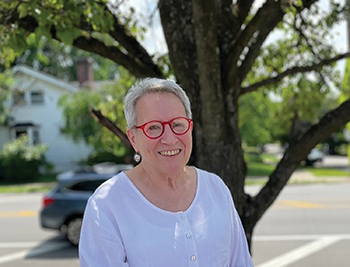Bladder Cancer Survivor
Support and a sense of humor help survivor

When Marian Kasey Lancaster learned she had invasive bladder cancer at 73, it was not her first time facing cancer. She had a mastectomy and chemotherapy to treat breast cancer almost 20 years before. In spite of cancer, she is enjoying life with support from her family and online groups, and she is keeping her sense of humor. She encourages other survivors to educate themselves about their disease and reach out for support.
While I waited on the table in the exam room for my first cystoscopy, naked from the waist down with a sheet over my lap, I was pretty sure I was facing another cancer. Three urine tests to rule out UTIs and two CT scans had not shown a cause for the occasional blood in my urine over the previous seven months. My sister was by my side, and I was ready to face whatever came.
The tumor in my bladder reminded me of a pink sea creature. I later named her Priscilla, Queen of the Bladder (if you saw the movie The Adventures of Priscilla, Queen of the Desert, you might remember the hot pink dress). As lovely as she was, she had to go! The surgery to remove this tumor is called TURBT (transurethral resection of bladder tumor). It is usually an outpatient procedure but does require general anesthesia. My sister had typed up an eviction notice to Priscilla that we taped to my abdomen before the surgery. Fortunately, my urologist had a good sense of humor.
The pathology report showed that Priscilla was high grade and had invaded the lamina propria. After she was removed, I was given intravesical chemo (in the bladder). Because of the high grade, I was also scheduled for another TURBT to make sure there was no tumor in the muscle layer. This second surgery took place five weeks later and was clear. My urologist told me everything looked good, and he felt he had removed all of the tumor.
The next phase of treatment, intravesical immunotherapy with BCG, was delayed a few weeks, which raised my anxiety. The plan was to have BCG treatments once a week for six weeks or more. Several days before my appointment, there was blood in my urine. The doctor assured me it was probably caused by scabs from the last TURBT, so the appointment was rescheduled for a week later. That BCG treatment went smoothly, and I had no side effects or discomfort. The following week was Thanksgiving, so another delay.
The Sunday after Thanksgiving, I started bleeding again. I was told to keep my scheduled appointment later that week, and my urologist performed another cystoscopy. There were five new tumors, so a third TURBT was scheduled. These tumors were also high grade and had invaded the lamina propria.
Because of the aggressiveness of my cancer, I was transferred to a urological oncologist at the cancer center. The hospital where I received my treatment is the only NCI-designated cancer center in my state. I first met my new doctor in January, and we discussed treatment options. I could have tried the BCG treatments again. However, because of how quickly my tumors recurred, I felt that eventually they would spread to the muscle layer. I decided to have a radical cystectomy – removal of my bladder and urethra – and a total hysterectomy, which was recommended because my cancer was high grade and invasive. For my urinary diversion, I chose an ileal conduit. The surgery was scheduled for mid-February.
The cystectomy and hysterectomy lasted more than six hours, and I faced some challenges as I recovered. My time with a stoma nurse in the hospital was limited, and I had problems with leaking when I got home. This finally was resolved by changing the type of bag. There is a learning curve to being able to change the pouch quickly, but it gets easier with practice. I call my stoma Rosie when she is behaving. When she starts spitting at me, I call her Stella (in reference to the movie A Streetcar Named Desire).
The help and support I’ve received have been invaluable. My sister has been my rock throughout this journey. She is the executive director of Friend for Life Cancer Support Network. She was able to connect me with two other bladder cancer survivors. These women helped me decide what type of diversion I wanted and gave practical suggestions on adjusting to this new way of life. My sister also suggested contacting the Bladder Cancer Advocacy Network (BCAN.org). BCAN is a wonderful organization that provides excellent information on bladder cancer and works to increase funding for research to find new treatments and hopefully, one day, a cure.


